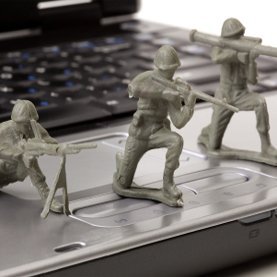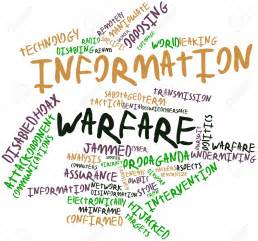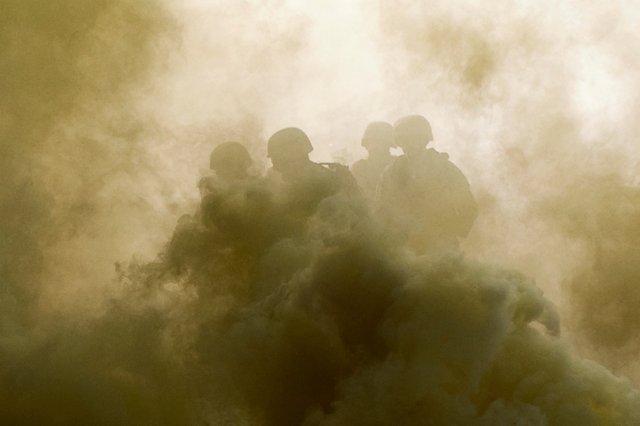How to be an InformationWar Activist - Part Fourteen: Information War and the Fog of War
war is the realm of uncertainty; three quarters of the factors on which action is based are wrapped in a fog of greater or lesser uncertainty
/Clausewitz, On War

Credit: COURTESY OF JOHN SOLIE VIA ISTOCKPHOTO.COM
Hey, everybody else uses this line, why not me? ;>
What is the "Fog of War"
All actions in war take place in an atmosphere of uncertainty, or the “fog of war.” Uncertainty pervades battle in the form of unknowns about the enemy, about the environment, and even about the friendly situation. While we try to reduce these unknowns by gathering information, we must realize that we cannot eliminate them—or even come close. Te very nature of war makes certainty impossible; all actions in war will be based on incomplete, inaccurate, or even contradictory information. War is intrinsically unpredictable. . . . At best, we can hope to determine possibilities and probabilities.
/MCDP 1
There is some semantic argument about what the term means...
The so-called fog of war is one of the most pervasive and natural metaphors in the English language (Kiesling)
a great deal of confusion and misunderstanding generated by the works of commentators, scholars, and technicians who approach the topic. (Canabarro, R., & Borne)
But, at the end of the day, it is the practicality of the term that matters.
The term “fog of war” is often associated with the commander’s lack of clear information on the battlefield. “War is inherently volatile, uncertain, complex, and ambiguous. For this condition, contemporary U.S. military usage offers the acronym VUCA.” Compounding the “fog of war” on the modern battlefield is the high tempo of operations or speed sought by commanders to overwhelm and defeat the enemy.(Needham, P., & Snyder)
At a later time, I will go into more detail about the pace of events that can complicate or increase the fog or war
Continuums of War
Even in our definitions of what lies where on the warfare stratum, there is a "fog of war"
As an example, the term psyops has been purged from the military lexicon because it became politically contentious. Another term is information operations, or IO, the meaning of which has morphed so often that members of a vexed Senate Armed Services Committee directed the U.S. Defense Department to define the term, identify the players and explain how it is managed. ( Campen)
I'll point back to this old post, How to be an InformationWar Activist - Part Four: What the heck IS Information War? (UPDATED), to give you a sense of where I am talking about Information War in relation to Fog of War through this article.
Conventional war is a very limited area on the continuum. Once you have moved past large armies maneuvering around terrain, there are a lot of combinations of warfare modes that can be combined in what is known as Hybrid War; there are many varieties of Hybrid War, as many as there are combinations of warfare nodes.
Information War overlaps with the term Cyberwar in some respects...
A sort of non-military information-related multidimensional conflict, that could be waged by state and non-state actors with a wide range of available tools (public diplomacy, propaganda, interference with local media, the control of computer networks and databases, etc.), (Canabarro & Borne)
There is often some confusion about the terms Information War and Information Operations, as well:
In the military, information operations, intelligence operations, routine administrative functions, etc., have all been increasingly developed and transformed with the support of interconnected electroelectronic tools. (Zimet & Barry, 2009; Libicki, 2012; Rid, 2012a) The same applies to the civilian sector. (Blumenthal & Clark, 2009; Kurbalija & Gelbstein, 2005; Zukang, 2007) As a result of the steady growth and the spread of the Internet and interrelated technologies in the last two decades, cyberspace has been greatly enlarged. (Canabarro & Borne)
Finally, consider the end goal of war:
The third element Clausewitz identified is war’s political nature. According to him, warfare must transcend the use of force. To become “the continuation of policy by other means,” (Clausewitz, 2007:28) warfare has to be attached to a political entity or to a representative of a political entity, whatever its constitutional form. (Canabarro & Borne)
Pace of War
I touched on this a moment ago, but let's revisit the concept in terms of Fog of War. Remember that the fog of war makes conflict harder to sort out...
A complex adaptive social system marked by openness, emergence, nonlinearity, and some degree of chaos would be difcult enough to assess objectively (Connable)
And as events unfold, they can outpace resources to collect, analyze, decide upon, and to communicate decisions based on data.
Nowhere do the associated implications of the fog of war have greater impact and effect than on information processing and decision-making. (Elward)
Elward's statement moves us to the OODA loop...
Information is merely an enabler for decision-making; it feeds into a decision-making model but does not substitute for it. One commonly accepted model is the OODA Loop, defined by USAF Col. John Boyd. The loop characterizes a repeating cycle within the cognitive process: observe, orient, decide, and act. Information from a variety of sources, cross-linked with other cognitive inputs such as experience and cultural traditions, feeds into the “observe” and “orient” portions of the loop. Orientation is critical — it provides the context by which information is filtered and processed in the human brain. This combination of observation processed through a contextual lens enables a “decide” element that feeds back into observation and feeds forward into the “act” element. The outputs of an OODA loop are unique to the decider because of the contextual lens. (Pietrucha)
If you want to manage information quicker than the enemy does, this is something to consider.
Information Superiority. The operational advantage derived from the ability to collect, process, and disseminate an uninterrupted flow of information while exploiting or denying an adversary’s ability to do the same.
/Joint Publication 3.13 Information Operations (2014)
The fog is thick
And as the pace of information sharing...whether the information is true or false...intensifies, it accelerates both the pace of Information War and the amount of work necessary to analyze it.
The potential of “information clutter” is rarely addressed. In sensor terminology, individual signatures are often buried in the clutter (i.e., other things that have similar signatures but are not the target). For information flows, the tiny bits of good data are buried in an avalanche of incomplete or incorrect data and, if the enemy has a say, actively misleading data. (Pietrucha)
This is also known as analysis paralysis or information overload
Latching onto a specific theory underlying a situation before getting all the facts is more liable to happen under these circumstances.
Things aint always what the theory says they is
Assessment of Iraq’s mobile-phone network provides another example of the failure of subjective thresholds to capture actual progress. As violence ebbed in Iraq,Iraqi cell-phone purchases skyrocketed, but the overall number of phones hid the fact that many Iraqis had to purchase three or more phones because there were no available roaming services from region to region.66 Te subjective threshold proved to be misleading. (Connable)
The relation to Information War
National Defense University professor Daniel Kuehl offers a useful taxonomy. He asserts that the base word cyber—a term derived from Norbert Wiener’s cybernetics theory of control and communications between animal and machine—must be parsed into three distinctly different elements. First is the connection—the network; then the content—the message; and finally cognition—the message effect. This deconstruct reveals the vastly different human skill sets and organizations, ranging from computer network operations to public affairs, that are involved in managing information as it flows between the machine and the human animal. (Campen)
I almost guarantee that in the time I took to write this blog, a piece of vital information regarding the Mandalay Bay Casino shooting was shared by some one...but in the endless flow of theories that people want to prove by focusing on certain facts (other facts? maybe not so much), vital facts will be overlooked.
Simply put, shared information does not result in shared awareness or even understanding. (Elward)
Friction, fog of war, nonlinearity, complexity, and fluidity all result in disorder and uncertainty, conditions in warfare that, according to the Marine Corps, can never be eliminated. (Connable)
Technology increases the Fog of War in Information Warfare
On the battlefield, technology can make it easier to sort out many of the details comprising the Fog of War
Lifting the Fog of War by ADM (ret.) Bill Owens (2000) and Stephen Biddle’s Military Power: Explaining Victory and Defeat in Modern Battle (2004) might sum up the two sides of the debate. NCW proposes that technology offers contemporary Western militaries the opportunity to dominate battlefelds by “lifting the fog of war.” (Connable)
But there is
prevalent debate over whether technologies can ultimately eliminate [it] (Elward)
In Information War, the FACT that so many people have access to computers and the net makes the sharing of so much false data accelerate the pace of battle, and thus make the activists' job much harder to do...unless you are coming from an information War perspective in which hiding facts is the goal! (cough cough CNN)
References
Campen, A. (2010, August 24). Cyberspace Spawns a New Fog of War. Retrieved October 4, 2017, from https://www.afcea.org/content/cyberspace-spawns-new-fog-war
Canabarro, R., & Borne, T. (2013). Reflections on The Fog of (Cyber) War. National Center for Digital Government Working Papers, 13(001). Retrieved from http://scholarworks.umass.edu/cgi/viewcontent.cgi?article=1041&context=ncdg
Connable, B. (2012). Embracing the fog of war: assessment and metrics in counterinsurgency. Santa Monica, CA: RAND. Retrieved from https://www.rand.org/content/dam/rand/pubs/monographs/2012/RAND_MG1086.pdf
Elward, S. M. (2010). The Fog of War: A Necessary Component of Modern Warfare. NAVAL WAR COLL NEWPORT RI JOINT MILITARY OPERATIONS DEPT. Retrieved from http://www.dtic.mil/docs/citations/ADA525218
How to be an InformationWar Activist - Part Four: What the heck IS Information War? (UPDATED)
Kiesling, E. (2001). On war without the fog. Military Review.
Marine Corps Doctrine Publication (MCDP) 1, Warfghting,
Needham, P., & Snyder, C. (2009). Speed and the Fog of War: Sense and Respond Logistics in Operation Iraqi Freedom-I. DTIC Document. Retrieved from http://oai.dtic.mil/oai/oai?verb=getRecord&metadataPrefix=html&identifier=ADA493435
Pietrucha, M. (2016, January 7). Living With Fog and Friction: The Fallacy of Information Superiority. Retrieved October 4, 2017, from https://warontherocks.com/2016/01/living-with-fog-and-friction-the-fallacy-of-information-superiority/
The tag

The tag #informationwar, and posts that would be classified under that tag include methods of Information War, Propaganda, and Disinformation. The discussion would include governmental doctrine, historical application, Information War on the spectrum of warfare modes, recognition of fakenews, public OSINT, the concept of a Deep State and reaction to it, and critical thinking in analyzing these concepts.
By necessity, conspiracy theory can be discussed under this tag as they often address what many view as Deep State disinformation; this means that discussion of PizzaGate could fall under this discussion. However, I don't want to make this type of discussion the focus of the tag, but rather discussing these issues in terms of method
The ultimate purpose of my focus on InformationWar is to provide you with the tools to defend liberty within this mode of war.
This series index:
So you want to be an InformationWar Activist? - Part One (UPDATED)
How to be an InformationWar Activist - Part Two, Morality (UPDATED)
How to be an InformationWar Activist, Part Three: Is the Information War Winnable?(UPDATED)
How to be an InformationWar Activist - Part Four: What the heck IS Information War? (UPDATED)
How to be an InformationWar Activist - Part Five: The American Deep State (RESTEEMED)
How to be an InformationWar Activist - Part Six: The Personal Price (UPDATED)
How to be an InformationWar Activist - Part Seven: Who Might The Players be?(Updated)
How to be an InformationWar Activist - Part Eight: Making Sense of Multiple Levels of Corruption(Updated)
How to be an InformationWar Activist, Part Nine: The Power of Decentralization As A Tool (Updated)
How to be an InformationWar Activist - Part Ten: Committees of Correspondence, The first American Information War?(Updated)
How to be an InformationWar Activist - Part Eleven: Your Health and Information War
How to be an InformationWar Activist - Part Twelve: Information War, Binary Thinking , Utopian Thinking, Critical Thinking
How to be an InformationWar Activist - Part Thirteen: An Understanding of Decapitation Strategy and it's Uses Beyond Assassination
Steemit writers contributing to understanding Information War
@dragon40 - Civil War Diary
@lifeworship
@phibetaiota - Information War, OSINT
@fortified
@krnel - Critical Thinking/Cognitive Bias
@richq11 - Political Science
@dwinblood - Critical Thinking
@rebelskum - http://pizzagate.wiki, Din's Fire
@ausbitbank
@titusfrost
@canadian-coconut
@cupidzero - Subversion of the educational system
@ozmaga - counter-propaganda
@odinthelibrarian - OSINT, infosec
@newsagg
@goldgoatsnguns - Russia, finace, geopolitics
@truthforce
@openparadigm
Study Resources
- Some Resources for Studying Propaganda
- Index of Critical Thinking and Fighting the Information War
- Journal of Information Warfare
- INFORMATION WARFARE AND INFORMATION OPERATIONS (IW/IO): A BIBLIOGRAPHY
- https://www.zotero.org/stevedisme/items
Database focused on subjects like COINTELPRO, domestic security/intelligence, the security vs liberty balance, Constitutional (American) law re:security, leftism, islamism, propaganda, police intelligence, morality, neoconservatism, globalism, Information War, propaganda, and the Deep State

If you ever want a contributing blogger to information war, let me know. I can provide some insight. What are you looking for?
thanks!
I have been thinking about an article re: intelligence support for infowar operations, with a focus on actions individuals can take ; I think that would be within your expertise! (I been scrapin some nickels together to take the Area Intel course)
OTOH, any article you write that you feel falls under the tag (you get to use 5 tags, btw), just add the tag, and we have set up a curation account for additional exposure.
The tag #informationwar, and posts that would be classified under that tag include methods of Information War, Propaganda, and Disinformation. The discussion would include governmental doctrine, historical application, Information War on the spectrum of warfare modes, recognition of fakenews, public OSINT, the concept of a Deep State and reaction to it, and critical thinking in analyzing these concepts.
By necessity, conspiracy theory can be discussed under this tag as they often address what many view as Deep State disinformation; this means that discussion of PizzaGate could fall under this discussion. However, I don't want to make this type of discussion the focus of the tag, but rather discussing these issues in terms of method
The ultimate purpose of my focus on InformationWar is to provide you with the tools to defend liberty within this mode of war.
This post received a 2.11% upvote from @randowhale thanks to @stevescoins! To learn more, check out @randowhale 101 - Everything You Need to Know!
**@stevescoins got you a $6.55 @minnowbooster upgoat, nice!
Want a boost? Minnowbooster's got your back!
The @OriginalWorks bot has determined this post by @stevescoins to be original material and upvoted it!
To call @OriginalWorks, simply reply to any post with @originalworks or !originalworks in your message!
To enter this post into the daily RESTEEM contest, upvote this comment! The user with the most upvotes on their @OriginalWorks comment will win!
For more information, Click Here! || Click here to participate in the @OriginalWorks writing contest!
Special thanks to @reggaemuffin for being a supporter! Vote him as a witness to help make Steemit a better place!
@mrainp420 has voted on behalf of @minnowpond. If you would like to recieve upvotes from minnowpond on all your posts, simply FOLLOW @minnowpond. To be Resteemed to 4k+ followers and upvoted heavier send 0.25SBD to @minnowpond with your posts url as the memo
This post has received a 4.32 % upvote from @booster thanks to: @stevescoins.
Manually curated and resteemed by @openparadigm for
@informationwar
nice job...bro